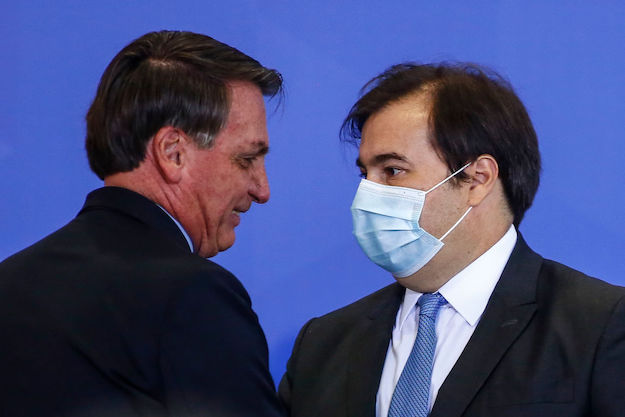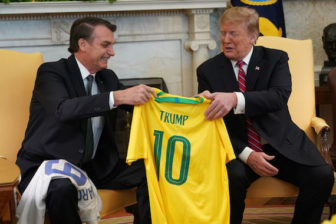SÃO PAULO – Growing concern in Brazil’s legislature, judiciary and civil society about the number of active-duty and reserve members of the military embedded in the Bolsonaro government has led Rodrigo Maia, president of Brazil’s lower house of Congress, to call for a rule that would limit the role of the armed forces in government. In an interview with Estadão newspaper earlier this month, the five-term congressman argued that it was “important to separate the state and the government. The armed forces are in the state. Policy makers, ministers, the president are in government. It is important to make clear that there is a wall.”
The number of military men in Jair Bolsonaro’s government is indeed staggering. According to a recent assessment commissioned by Brazil’s Federal Court of Accounts, known by its initials TCU in Portuguese, 6,157 military men and women (roughly split between active-duty and reserve) are currently serving in the Bolsonaro administration. That’s more than twice as many as under former President Michel Temer, and even more than at any point during the military dictatorship between 1964 and 1985. The vice president is also a reserve general, and 10 of 23 Cabinet positions are held by either current or former military figures.
Maia is not the first political leader to speak out against the creeping militarization of politics. The situation has led Luiz Roberto Barroso, a Supreme Court justice, to draw parallels to Venezuela, where the armed forces also slowly assumed key political positions, bluntly stating that Brazil’s government was experiencing a “Chávezization.” Former Health Minister Luiz Henrique Mandetta, who was sacked by Bolsonaro in April after refusing to toe the president’s line of minimizing the public health crisis, recently warned that the government’s response to the pandemic has been led by an active-duty general who was responsible for overseeing military operations in the western Amazon region, without any previous experience in public health.
Militarization had diminished the health ministry, which now employs over 1,200 military personnel, Mandetta said. In a similar vein, Supreme Court Justice Gilmar Mendes argued that the fact that General Eduardo Pazuello was serving as interim health minister in the midst of the worst pandemic in a century, which has claimed over 100,000 lives in Brazil, was “terrible for the armed forces’ reputation,” adding provocatively that “the military is associating itself with genocide.” The accusation led to a fierce reaction by both the defense minister, General Fernando Azevedo, and Brazil’s vice president, General Hamilton Mourão, who said the justice had gone “too far.” Yet even they cannot deny that blurring the line between the armed forces and government creates uncertainty among civilians: Does an active-duty general who also happens to be the interim health minister speak on behalf of the ministry or on behalf of the armed forces? Does criticizing Pazuello imply attacking the armed forces?
By proposing an actual rule and a specific date by which it would be valid, Maia is the first to structure a public debate that could generate momentum without directly confronting the military leaders currently occupying numerous key positions in the government, with whom he needs to maintain a productive working relationship. Maia, known for his pragmatism and conciliatory style, suggests that active-duty military officials should be banned from occupying government positions starting with the next incoming administration, in January 2023, thus providing enough time for presidential candidates planning to challenge Bolsonaro to embrace the idea.
While most criticism of the military’s growing political power comes from civilians, Maia’s proposal paradoxically finds relevant support among some generals — such as former minister Carlos Alberto Santos Cruz — who are increasingly aware that the armed forces’ highly visible role in the Bolsonaro government may damage their reputation. After all, the armed forces have been, along with churches, the most respected institution in Brazil since redemocratization. Yet that very reputation of moral rectitude and technical expertise rested on their above-the-fray approach to politics and preference for staying out of the public limelight.
Another area under public scrutiny is environmental protection, where Vice President Mourão has been tasked with reducing deforestation in the Amazon region — a near-impossible mission considering that the president’s core supporters include illegal loggers, ranchers and miners who are unlikely to forget Bolsonaro’s campaign promise to weaken environmental regulation. As Folha de São Paulo columnist Celso Rocha de Barros shrewdly observed, “The military seems to have thought they would enjoy the benefits of being in government without [paying the price].” Indeed, torn between assuming greater control and seeking to dissociate themselves from the government, the generals increasingly realize they have been lulled in by Bolsonaro.
A law that would require members of the military to leave active duty prior to accepting positions in government would no doubt help assuage concerns that a possible Bolsonaro second term would consolidate the administration’s de facto status as a military government. Indeed, the large number of active-duty generals advising the president has made Bolsonaro’s threats against the Supreme Court sound even more dangerous, especially after they have repeatedly chosen not to publicly reject the president’s authoritarian rhetoric. In this sense, Maia’s proposal can be understood as an attempt to safeguard Brazil’s democracy from the creeping militarization that was a key element of the erosion of democracy in Venezuela. Will Maia’s proposal succeed?
After growing pressure from fellow generals, Bolsonaro’s Secretary of Government Staff Luiz Eduardo Ramos decided to retire from active duty in July. Pazuello, on the other hand, has ignored calls to do the same, and continues to enjoy the president’s strong backing. In the same way, thousands of active-duty members of the military who also enjoy the benefits of being in government are unlikely to support giving up their privileges. A key determinant of whether the proposal can succeed is whether other opposition leaders are willing to publicly support it.
In any case, Maia’s important initiative is set to help take an ongoing debate about whether Brazil’s armed forces have accumulated too much political power to a new, possibly more consequential level.







